 Published in 2005, John Green's debut novel Looking for Alaska has always made waves. With nine accolades, including being the winner of the 2006 Michael L. Printz Award, Looking for Alaska has set the bar high for young adult fiction. Fans of the novel have watched as other John Green book were published and accordingly turned into films--most notably, The Fault in Our Stars and Paper Towns. Finally, Looking for Alaska has got the adaptation it deserved. In October 2019, Hulu released an eight-episode adaptation of the same name. But what's the verdict? Is the book better than the TV show here? Read on for my thoughts, and, at the end, my verdict!
Published in 2005, John Green's debut novel Looking for Alaska has always made waves. With nine accolades, including being the winner of the 2006 Michael L. Printz Award, Looking for Alaska has set the bar high for young adult fiction. Fans of the novel have watched as other John Green book were published and accordingly turned into films--most notably, The Fault in Our Stars and Paper Towns. Finally, Looking for Alaska has got the adaptation it deserved. In October 2019, Hulu released an eight-episode adaptation of the same name. But what's the verdict? Is the book better than the TV show here? Read on for my thoughts, and, at the end, my verdict!John Green is the #1 New York Times bestselling author of Looking for Alaska, An Abundance of Katherines, Paper Towns, The Fault in Our Stars, and Turtles All the Way Down. He is also the coauthor, with David Levithan, of Will Grayson, Will Grayson. He was the 2006 recipient of the Michael L. Printz Award, a 2009 Edgar Award winner, and has twice been a finalist for the Los Angeles Times Book Prize. Green's books have been published in more than 55 languages and over 24 million copies are in print. Josh Schwartz, American screenwriter and television producer, is responsible for adapting the beloved Looking for Alaska for TV. Schwartz is best known for creating and executive producing the Fox teen drama series The O.C., for developing The CW's series Gossip Girl based on the book of the same name, and for co-creating NBC's Chuck.
 before. Miles "Pudge" Halter's whole existence has been one big nonevent, and his obsession with famous last words has only made him crave the "Great Perhaps" (François Rabelais, poet) even more. He heads off to the sometimes crazy, possibly unstable, and anything-but-boring world of Culver Creek Boarding School, and his life becomes the opposite of safe. Because down the hall is Alaska Young. The gorgeous, clever, funny, sexy, self-destructive, screwed-up, and utterly fascinating Alaska Young, who is an event unto herself. She pulls Pudge into her world, launches him into the Great Perhaps, and steals his heart.
before. Miles "Pudge" Halter's whole existence has been one big nonevent, and his obsession with famous last words has only made him crave the "Great Perhaps" (François Rabelais, poet) even more. He heads off to the sometimes crazy, possibly unstable, and anything-but-boring world of Culver Creek Boarding School, and his life becomes the opposite of safe. Because down the hall is Alaska Young. The gorgeous, clever, funny, sexy, self-destructive, screwed-up, and utterly fascinating Alaska Young, who is an event unto herself. She pulls Pudge into her world, launches him into the Great Perhaps, and steals his heart.
after. Nothing is ever the same.
When I first read Looking for Alaska, I was way too young to appreciate the full complexity of the novel. Which, you know, can happen if you read a book at the wrong time in your life. I'd always wanted to get back to it, hoping that I'd get it when I was older. When I saw that Looking for Alaska got a tv-series on Hulu of the same name, I knew it was time. Like with what I did for The Lovely Bones, this review is a book-to-tv series adaptation review. Below, I'll be breaking down each episode of the 8-episode series, comparing the book and the adaptation, and deciding what I liked about the adaptation and what I didn't.
"Famous Last Words" (Episode 1)
We open on the scene of an accident, full of cigarettes, rain, and police lights. For those who've read the book, we know what this scene captures. This is the scene that, for the entire novel, we're working our way towards. I liked this as the opening scene, vs. Miles's cringe-worthy going away party, because it sets a somber tone for the story. The producers don't make this story anything that it's not, and they show you that with just the opening scene.
That being said, Miles's going away party is absolutely cringey, all the way down to the shots of the food that we know will all go uneaten (remember this for later!).
 There were some notable differences in the tv series than in the books, and changes that I think added to the story overall. Firstly, we flashed to Alaska moving herself out. This gave viewers the opportunity to understand just a figment of her home life, and introduced us to Alaska before Miles was introduced to her. Secondly, Paul and Marya are at the school when Alaska arrives. In the book, Paul and Marya were kicked out of Culver Creek the year before. In my opinion, this allowed us to better understand the Culver Creek ethos, the "Weekday Warrior" vs. everyone else mentality, and also makes for a more dramatic and mysterious opening storyline. Another addition to add to the mystery is when Alaska is caught burying the wine in the woods. The branch snaps but we don't get to see who's there. If we weren't already tipped off that something was going to go wrong, we were at that moment, near the end of the episode.
There were some notable differences in the tv series than in the books, and changes that I think added to the story overall. Firstly, we flashed to Alaska moving herself out. This gave viewers the opportunity to understand just a figment of her home life, and introduced us to Alaska before Miles was introduced to her. Secondly, Paul and Marya are at the school when Alaska arrives. In the book, Paul and Marya were kicked out of Culver Creek the year before. In my opinion, this allowed us to better understand the Culver Creek ethos, the "Weekday Warrior" vs. everyone else mentality, and also makes for a more dramatic and mysterious opening storyline. Another addition to add to the mystery is when Alaska is caught burying the wine in the woods. The branch snaps but we don't get to see who's there. If we weren't already tipped off that something was going to go wrong, we were at that moment, near the end of the episode.
The way the tv-series plays with time and shows the passage of it is interesting too. The passage of time is lesser known in the tv-series, and yet I feel like there's more intrigue surrounding it. This is most likely due to the fact that we have two mysteries set up straight from the get go: who ratted on Paul and Marya? and what happened in that opening scene?
Miles and Alaska were set up as polar opposites from the start. The difference in their home situations and the parallel yet separate car ride experiences show us how different they are from the beginning. So, when they get that first look (Miles in the car, Alaska outside her car), it's really interesting that that's the first spot their paths cross. And, of course, that they have that first look at each other when surrounded by vehicles.
As I was watching this first episode, I took a note that read: "So far, very close to the book and follows the most minute details, I'm very in love with this adaptation." It is true: the tv-series closely mirrors the book. They have all the details down to Miles's world map and the shitty shower. Chip's opening lines are pulled exactly from the book, and so are Miles's when he first meets Chip. The casting of Miles and Chip was perfect, and I was a little bit in love with the Colonel as he delivered those opening lines and welcomed Miles into Culver Creek. All of the actors were incredible at bringing the characters to life. All of the pull quotes used in the first episode were well chosen and well delivered. The lines that also aren't from the book match the characters well, and add to the plot and to our understanding of their backgrounds.
The other imagery that I paid attention to was the daisy imagery, and the swan imagery. The swan was seen in the opening credits of this episode, and harkens back to the idea that "the dangerous ones always are [beautiful]." The daisy is heartbreaking, and something that will need to be remembered later on in the series. It was smart to open with some of these images, especially because they're very foreshadowing of what's to come, but also forgettable if you're not paying attention.
Overall, the first episode of the tv-series was spot-on. The phone call at the end pulls Miles's Great Perhaps back into the equation, and soon we will see where that takes him.
"Tell Them I Said Something ..." (Episode 2)
We don't know that everything in this episode happens 84 days before until the end of the episode. Time has less and more of a presence, which I tried addressing above, but will do so in more detail here. Each scene in the beginning of the book is titled as "x days before" which means that each scene is saturated with our wanting to know before what? Time is basically a character in that sense, but we are almost so desensitized by it, since there are so many of those headings. In the tv series, they only tell us how many days before at the end of the episode. In that way, we are also forgetting that we're working our way towards something. But, when that header flashes on, we get anxious again, because we know we must be working towards the scene of that car accident. This countdown is one of the more genius parts of Looking for Alaska, in my opinion. In the book, we know something's coming, but we don't know what, or why it's important. And once we get there, there's no going back.
 One of my favorite additions to the tv-series was the debutante ball. Not only does this give Sara and the Colonel's relationship more screen time, but also shows more of a divide between the rich and poor kids at Culver Creek. The debutante ball also sets the scene for more pranks (both at school and the ball itself), which is always entertaining. I love that Sara's character is bigger in the tv series, and that she's not just some "Weekday Warrior" whose motives and background we don't get to understand. I appreciate that we get to explore her life a bit, and understand when she chooses the Colonel, and when she doesn't. The tv series also allows us to follow the characters even when Miles isn't there, which is something the book doesn't allow us to do. When Sara and the Colonel talk alone, I really feel like it's an opportunity to get to know some of the other characters better, in a way we didn't get to in the books. Overall, the debutante ball was a great addition: we get more pranks, more complexity of character, and more storyline that aligns with the characters and their interests.
One of my favorite additions to the tv-series was the debutante ball. Not only does this give Sara and the Colonel's relationship more screen time, but also shows more of a divide between the rich and poor kids at Culver Creek. The debutante ball also sets the scene for more pranks (both at school and the ball itself), which is always entertaining. I love that Sara's character is bigger in the tv series, and that she's not just some "Weekday Warrior" whose motives and background we don't get to understand. I appreciate that we get to explore her life a bit, and understand when she chooses the Colonel, and when she doesn't. The tv series also allows us to follow the characters even when Miles isn't there, which is something the book doesn't allow us to do. When Sara and the Colonel talk alone, I really feel like it's an opportunity to get to know some of the other characters better, in a way we didn't get to in the books. Overall, the debutante ball was a great addition: we get more pranks, more complexity of character, and more storyline that aligns with the characters and their interests.
In the first episode, Alaska doesn't grab Miles's hand when she technically does in the book, but she does in this episode. As they're fleeing the scene of the crime, she reaches for him and he speeds up. I felt that this had more symbolism than just the "Run run run run" moment in the novel. Setting is important, and the fact that they were fleeing the scene of a prank, which could have been a crime, aligns with what we need to know about Alaska in this moment.
 As far as the romances go, I think it's perfect that we see Miles and Lara trying to talk a bit more earlier on. This is probably to make their future relationship a bit more believable, which I understand is necessary if we're going to get behind it. But it's still Alaska that Miles sees, beckoning him out the window (which doesn't happen in the book). Getting kicked out of class this way builds the idea that Miles believes Alaska is his Great Perhaps, which is supposedly his biggest motivator through life at Culver Creek. But when he stands jury, we all know that all Miles must be thinking is that he wants to get out of Culver Creek alive.
As far as the romances go, I think it's perfect that we see Miles and Lara trying to talk a bit more earlier on. This is probably to make their future relationship a bit more believable, which I understand is necessary if we're going to get behind it. But it's still Alaska that Miles sees, beckoning him out the window (which doesn't happen in the book). Getting kicked out of class this way builds the idea that Miles believes Alaska is his Great Perhaps, which is supposedly his biggest motivator through life at Culver Creek. But when he stands jury, we all know that all Miles must be thinking is that he wants to get out of Culver Creek alive.
"I've Never Felt Better ..." (Episode 3)
The thread of secrets and lies is strong within this episode, making it one of my favorites of the whole miniseries. There are moments where the show deviates from the book here, but in ways that makes the tv show stronger, and possibly more real for viewers.
 Figuring out who ratted on Paul and Marya is a big deal at Culver Creek, based on their strict code of honor. There is more of a mystery surrounding this than in the novel. Everyone found out that Alaska was the rat in a more public setting than a private one, which has its desired effects on Alaska. Rather than Alaska going to her friends and trusting them with her mistake, she's publicly outed and humiliated. For a self-destructive and lonely girl like Alaska, this is devastating to her mental health and her understanding of herself. She isn't allowed to be who she is, because she's pushing herself to be who she thinks she should be. It's breaking her. In the book, this complexity isn't as clear, because Miles doesn't understand that about her. Instead, he's just fascinated with her. We get that side of it, too, with specific camera angles that put everything else in a blur when she's in focus, showing us how curious Miles is about her. But we also get to see Alaska as a person, not just a figure of fascination. This is highlighted when Alaska goes and visits her boyfriend and breaks up with him. That scene, along with giving us understanding about Alaska's character, also gives viewers logic to follow as Alaska continues to make the following choices.
Figuring out who ratted on Paul and Marya is a big deal at Culver Creek, based on their strict code of honor. There is more of a mystery surrounding this than in the novel. Everyone found out that Alaska was the rat in a more public setting than a private one, which has its desired effects on Alaska. Rather than Alaska going to her friends and trusting them with her mistake, she's publicly outed and humiliated. For a self-destructive and lonely girl like Alaska, this is devastating to her mental health and her understanding of herself. She isn't allowed to be who she is, because she's pushing herself to be who she thinks she should be. It's breaking her. In the book, this complexity isn't as clear, because Miles doesn't understand that about her. Instead, he's just fascinated with her. We get that side of it, too, with specific camera angles that put everything else in a blur when she's in focus, showing us how curious Miles is about her. But we also get to see Alaska as a person, not just a figure of fascination. This is highlighted when Alaska goes and visits her boyfriend and breaks up with him. That scene, along with giving us understanding about Alaska's character, also gives viewers logic to follow as Alaska continues to make the following choices. 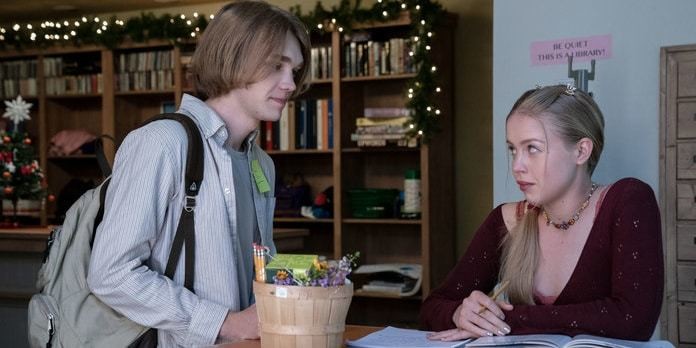 All I could think during this episode was, "poor Lara." Miles is so fascinated with Alaska that he doesn't see just how amazing and lovely Lara is, the girl who is so clearly into him. Lara is a character who isn't as explored much, either in the tv-series or the book. But, in the series, we get to see her facial expressions as she reacts to Miles and Alaska, and it's heartbreaking. This is a love-triangle, but it's such a fluid situation, as we find out later in the series. What really sucks about the whole thing is that it's so on-point that Miles is pining after Alaska, and thus Lara is stuck comparing herself to Alaska, who is this larger-than-life, broken and no one knows it character. Lara shouldn't have needed to compare herself to Alaska, but because Miles can't just tell Lara he doesn't really like her, Lara is stuck in this limbo. I think that was beautifully portrayed in the series, just through Lara's facial expressions.
All I could think during this episode was, "poor Lara." Miles is so fascinated with Alaska that he doesn't see just how amazing and lovely Lara is, the girl who is so clearly into him. Lara is a character who isn't as explored much, either in the tv-series or the book. But, in the series, we get to see her facial expressions as she reacts to Miles and Alaska, and it's heartbreaking. This is a love-triangle, but it's such a fluid situation, as we find out later in the series. What really sucks about the whole thing is that it's so on-point that Miles is pining after Alaska, and thus Lara is stuck comparing herself to Alaska, who is this larger-than-life, broken and no one knows it character. Lara shouldn't have needed to compare herself to Alaska, but because Miles can't just tell Lara he doesn't really like her, Lara is stuck in this limbo. I think that was beautifully portrayed in the series, just through Lara's facial expressions.
When Miles spots Alaska at Coosa's, it's a movie moment, in my opinion. There's a beautiful parallel there, that that's where he first spotted her, when he first sort of felt that curiosity towards her. And she's sitting there again, broken and yet Miles can't see that.
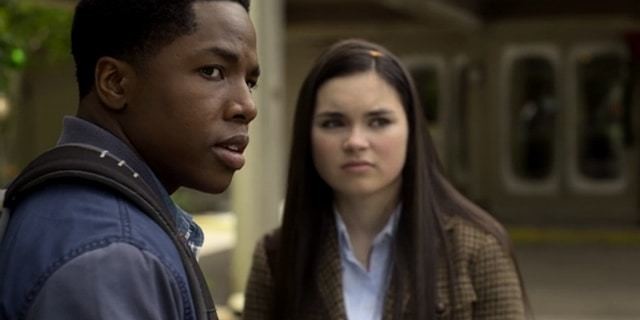 The dynamics between the Colonel and Sara are also so beautifully done in this episode. I just overall love how Sara has more of a character in the tv series, so any scene with her in it immediately captures my interest. The Colonel and Sara's relationship is so beautifully messed up, and of course there was no way for it to work, but I was really rooting for them.
The dynamics between the Colonel and Sara are also so beautifully done in this episode. I just overall love how Sara has more of a character in the tv series, so any scene with her in it immediately captures my interest. The Colonel and Sara's relationship is so beautifully messed up, and of course there was no way for it to work, but I was really rooting for them.
And, my last note is that it's important that we got to see the conversation between the Eagle and Alaska. We get to see what's fully at stake for Alaska in this moment, which is something we don't understand exclusively through Miles's point of view in the novel. In fact, a lot of what's portrayed in the tv series wouldn't be possible in the novel, but it's important to our understanding of the complexities of the story. The novel has a limited scope, whereas in the tv series, we can stop and explore what Alaska must have been feeling in that moment. It's absolutely perfect, because we start seeing the beginning of the end.
"The Nourishment is Palatable" (Episode 4)
Alaska ratted, violating the one true stipulation of the honor code. This is important to understand throughout this episode, because a lot of the conversation (or lack of it) revolves around this central fact.
 The Colonel and Takumi try to talk Miles out of staying with Alaska over Thanksgiving break. I'm not exactly sure if this is what happened in the book, too, but I think it's necessary. If ratting is such a big deal, then I do believe the Colonel's and Takumi's responses would have been to keep Miles out of it. So even if it didn't happen in the book, I felt that this addition was respectful to the ethos, and also a bit hilarious.
The Colonel and Takumi try to talk Miles out of staying with Alaska over Thanksgiving break. I'm not exactly sure if this is what happened in the book, too, but I think it's necessary. If ratting is such a big deal, then I do believe the Colonel's and Takumi's responses would have been to keep Miles out of it. So even if it didn't happen in the book, I felt that this addition was respectful to the ethos, and also a bit hilarious.
Communication is key in this episode, or at least understand who's talking to who about what. The fact that Alaska didn't tell her friends that she broke up with her boyfriend is a bit funny, but also worrisome. It goes to show how alone she really is, and how desperate she is for company. The fact that the Colonel makes an exception for Alaska on Thanksgiving but kicks her out of the car goes to show how stubborn he truly is. The fact that the relationships get rocky here--in episode 4, halfway through the series--is notable. We're also so much closer to the accident, so tense relationships adds to viewer anxiety about what's going to happen.
The turn of events that causes Miles to stay at Culver Creek for Thanksgiving is a bit different than in the book, but ultimately just as realistic. I enjoy how Thanksgiving break is a way for Miles to come to terms with what he really wants of Alaska: to get to know her better. He does more to try and understand Alaska and her suffering more than he does in the book. In a way, I think this will add to his guilt later, but also makes him a more likable and less passive character, without taking away any of the complexity of the novel itself.
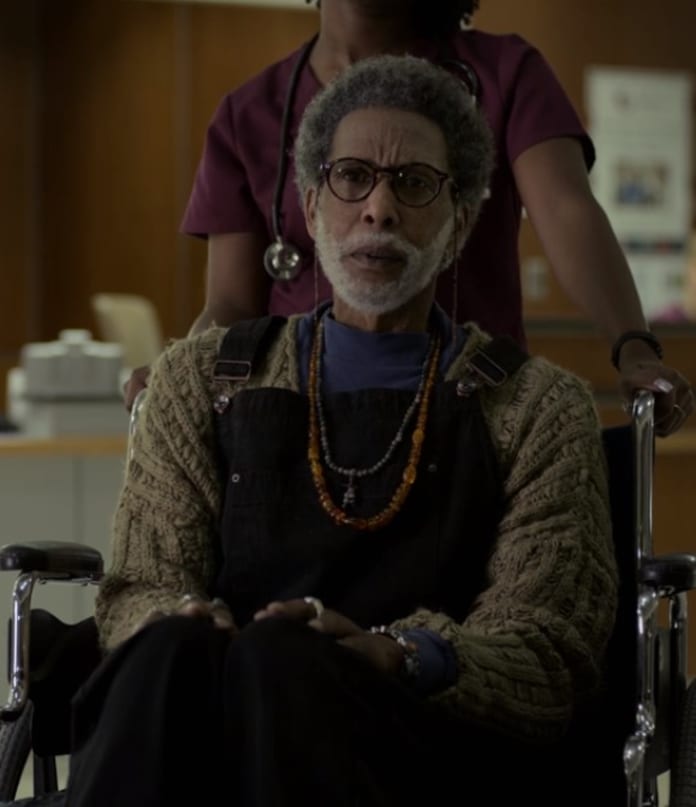 In this episode, we get more backstory surrounding Hyde, Miles's favorite teacher and mentor. Getting caught by Hyde in the woods was creepily reminiscent of how Alaska was caught there earlier in the series by the Eagle, but led to a greater lesson. Hyde's backstory is beautiful and adds more dimension to his character. When asked, How do we escape the labyrinth of suffering, we truly believe that Hyde might have an answer, or a way to explain that there is no answer, because we see his backstory and suffering. If anything, this teaches Miles that there's a lot more to a person than we think or we know from the surface or from a few conversations. Is this a lesson he truly learns right in that moment? That, as we know, is to be seen.
In this episode, we get more backstory surrounding Hyde, Miles's favorite teacher and mentor. Getting caught by Hyde in the woods was creepily reminiscent of how Alaska was caught there earlier in the series by the Eagle, but led to a greater lesson. Hyde's backstory is beautiful and adds more dimension to his character. When asked, How do we escape the labyrinth of suffering, we truly believe that Hyde might have an answer, or a way to explain that there is no answer, because we see his backstory and suffering. If anything, this teaches Miles that there's a lot more to a person than we think or we know from the surface or from a few conversations. Is this a lesson he truly learns right in that moment? That, as we know, is to be seen.
Thanksgiving is tense. There's a greater emphasis on the Colonel's anger and unrelenting attitude towards Alaska. There's a greater emphasis on the romantic and personal stakes between Miles and Alaska. There's also the contrast between Hyde's Thanksgiving and the kids' Thanksgiving that is stark and sad. Overall, the emphasis on the holiday is important to remember, because it is the last one. The choices they make during this week are haunting, from the invitations to dinner all the way up to being kicked out of the car. (*Kicked out of the car* is important as well.)
 My favorite scene from this episode is how Alaska and Miles fall asleep outside holding hands, and then the seamless transition from night to day when the Colonel finds them. That was a perfect way for one scene to end and for another to begin, and one that also highlights Alaska's desire for everything to stay innocent, and uncomplicated.
My favorite scene from this episode is how Alaska and Miles fall asleep outside holding hands, and then the seamless transition from night to day when the Colonel finds them. That was a perfect way for one scene to end and for another to begin, and one that also highlights Alaska's desire for everything to stay innocent, and uncomplicated.
"I'll Show You That It Won't Shoot" (Episode 5)
We are now more than halfway through the miniseries, and fans of Looking for Alaska know what's coming next.
My notes get more and more sparse from here on out, because I was truly engrossed with how the producers and actors brought this second half of the series to life. If you continue reading from here on down without having watched the show or read the book, there will be spoilers. You have been warned.
The addition of the boys hating Alaska will most likely add to their feeling of guilt later on, after Alaska dies. I felt like that hate reflected their firm belief in their honor code, but it would also explain why they try so hard to move the blame off of their shoulders. The actors did a fantastic job with that anger and disbelief, because when I was watching the show, I just knew how guilty they'd be in the later episodes. And I was right.
 Finally, in the opening credits of this episode, we see the passage of time. We're getting closer to the accident, and our feelings of anxiety, excitement, curiosity, and fear are all heightened in this episode. It's the beginning of the end, and the end of "before."
Finally, in the opening credits of this episode, we see the passage of time. We're getting closer to the accident, and our feelings of anxiety, excitement, curiosity, and fear are all heightened in this episode. It's the beginning of the end, and the end of "before."
One of my favorite parts about this episode is that Hyde's lessons don't always take the form of classroom lessons. He teaches Miles at every turn, in every conversation. This makes Hyde a more dynamic character, and one that affects more than just Miles's character. Even though his lessons go a bit out of order, they were deliberately placed, and in fact allow us to recall them as the series goes on. Overall, a fabulous choice in making Hyde a bigger character, and giving him the dimension needed to show viewers why he's such an influential role model.
 The big prank is a bit adjusted in this episode. There's the whole subplot about the dance that I thought was nicely added, and the fact that the prank itself isn't really the same. The characters move around this entire prank differently than in the novel, but it worked overall because it led them to the barn for one of my favorite scenes in the book. The best day/worst day game. I'll never understand why Alaska brought that up, if she was just drunk or just needed to get things off her chest, or both. Either way, that entire scene was well done. The characters dance around each other, rub against each other, and ultimately gives us the biggest clue we didn't know we needed.
The big prank is a bit adjusted in this episode. There's the whole subplot about the dance that I thought was nicely added, and the fact that the prank itself isn't really the same. The characters move around this entire prank differently than in the novel, but it worked overall because it led them to the barn for one of my favorite scenes in the book. The best day/worst day game. I'll never understand why Alaska brought that up, if she was just drunk or just needed to get things off her chest, or both. Either way, that entire scene was well done. The characters dance around each other, rub against each other, and ultimately gives us the biggest clue we didn't know we needed.
"We Are All Going" (Episode 6)
 This one is a tearjerker, and one of the most interesting episodes in the miniseries, because of its use of flashbacks. Immediately, we get the flashback of Alaska's best day at the zoo. It's an interesting choice, because we get to see that best day. We also get to see what exactly was on Alaska's mind as she woke up that morning. Was she remembering that best day for no reason? Or, was it just a dream and not really on her mind at all? Or, do we as viewers get to see it, but Alaska wasn't even sparing a second thought towards that experience? A whole host of questions, but no answers within just the opening scene.
This one is a tearjerker, and one of the most interesting episodes in the miniseries, because of its use of flashbacks. Immediately, we get the flashback of Alaska's best day at the zoo. It's an interesting choice, because we get to see that best day. We also get to see what exactly was on Alaska's mind as she woke up that morning. Was she remembering that best day for no reason? Or, was it just a dream and not really on her mind at all? Or, do we as viewers get to see it, but Alaska wasn't even sparing a second thought towards that experience? A whole host of questions, but no answers within just the opening scene.
And then, the passage of time. "1 day before" we are told, which is a complete break in form from previous episodes. That's how we know that a) this is the last day before the accident and that b) this accident is inevitable. At first, it feels like it could have been avoided, but we still have worked up to exactly what we're supposed to have worked up to. It's nerve-racking, to be quite frank.
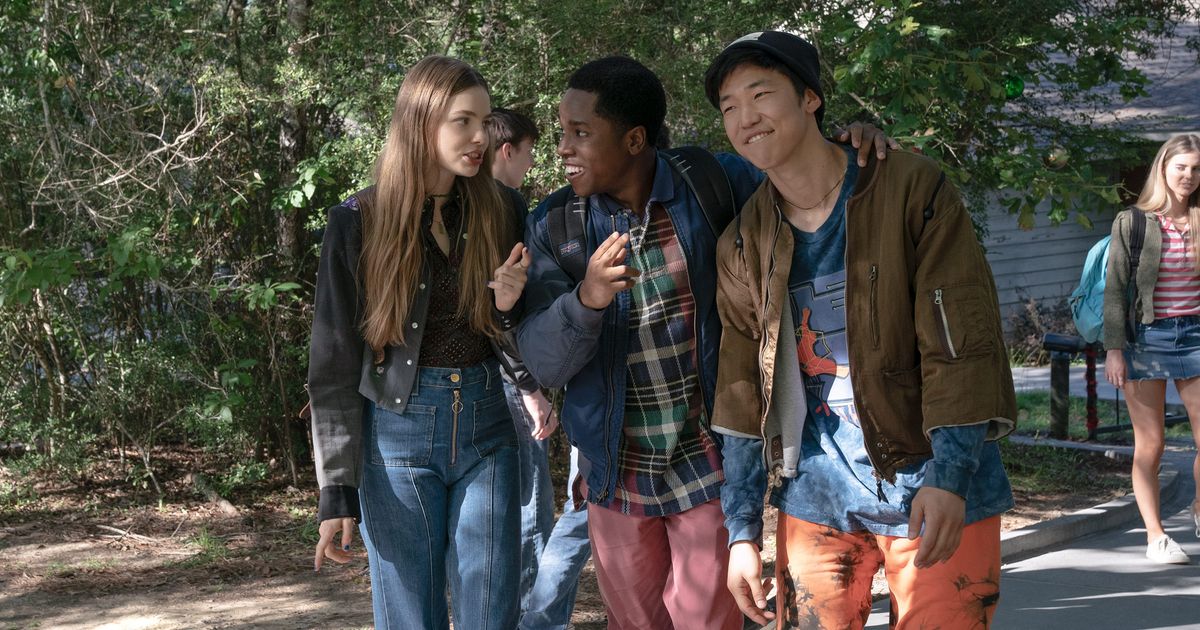 The prank from the previous episode is what draws us back in to how that day began. There are potential legal consequences, which makes sense for the prank, but is not in the novel. That's interesting to note, because it makes the entire situation more believable, but also scary because it means we might also lose the Colonel. So already we have a lot of themes about last days, and best days, and worst days. All I have to say is that everything in this episode, this last day, is important to note.
The prank from the previous episode is what draws us back in to how that day began. There are potential legal consequences, which makes sense for the prank, but is not in the novel. That's interesting to note, because it makes the entire situation more believable, but also scary because it means we might also lose the Colonel. So already we have a lot of themes about last days, and best days, and worst days. All I have to say is that everything in this episode, this last day, is important to note.
There are a few blasé mentions of death in this episode, along with Alaska's turning in of her paper. My question for this moment is, did she turn it in early? That would help us understand if the accident was an accident or not.
The flashback to the Colonel's and Alaska's first meeting is also interesting to note, because it's our second flashback in the whole series, and both are contained within this episode. Again, if we weren't tipped off that something was going to happen, this choice would certainly make us nervous. If not for the Colonel, then for Alaska too, because those two characters were involved in the two flashbacks.
But then, we see a flash-forward when Miles and Alaska are talking. Where will she be in ten years? I don't think I need to write explicitly about why this is so heartbreaking.
The one thing that's interesting to note is that Miles asks if Alaska is okay to drive at the end of the episode. He does not do that in the novel. The Colonel asks Alaska, "Are you sure you're okay?" in reference to the fact that she's obviously upset about something, but they both let her go. I can't figure out why Miles has the line to ask if she's okay to drive. It's pretty clear that they don't do that in the novel, for specific reasons that add to their feeling of guilt later on. Either way, this is the most noteworthy deviation from the novel that almost (almost) messes with the meaning of book. Since it's such a small thing, though, it will most likely go unnoticed by those without explicit knowledge of the book.
And then, the accident.
"Now Comes the Mystery" (Episode 7)
The grief in this episode is fantastically portrayed, and I admit to shedding a tear or two. Seeing Chip and the Eagle hug was heart-wrenching, and seeing the Eagle grieve is such an important angle to explore. Everyone is blaming themselves: Miles, the Colonel, Takumi. I think it's important to see (and probably accurate, too) how the Eagle would blame himself in this scenario.
I enjoyed the passage of time as Miles and the Colonel grieved. The shots of the Colonel just walking to nowhere were so powerful, as well as Miles's literal inability to move or to dedicate himself to something other than mind-numbing video games. When the day of the funeral approached, Miles going to Hyde for a tie was also a powerful addition. We got to flashback to Hyde's loss of love (if you're counting, this is the third flashback, but the fourth "flash"). In a way, we saw the parallel of that loss and grief. It went to show that Hyde understood Miles, in a way that I think Miles needed in that moment.
The flash of food at the funeral is like the flash of food at the beginning, at Miles's failed going away party. The beginning in contrast with the beginning of the end. This was what his Great Perhaps was looking like: exactly like his failed going away. There are a lot of conclusions and parallels to these moments that I could probably take a whole other blog post to recognize, but I do want to say this. Anytime food is brought up, it's important, especially in the context of gathering. The fact that the sad and failed gathering at the beginning is reflective of the large and sad gathering at the end says something about the gathering of people and role food plays in that. I'll digress for now.
One of my favorite additions overall to the series was how the Colonel verbally assaulted Alaska's dad at the funeral. In the book, we do see that Miles directs some of his anger towards Mr. Young, but seeing it play out on the screen is intense in a way that captures how anger and grief play off of one another. This also allows us to see the role Mr. Young played (or didn't play) in Alaska's life, and how yet another person in this series blames themselves for the loss of Alaska. Beautifully done.
 Another addition, albeit not as fabulous as the one mentioned above, is Jake's presence at the funeral. This is more believable than him not coming, which is what happened in the novel. Jake's presence means that the Colonel, Takumi and Miles get the answers about Alaska's last phone call sooner than they do in the novel. It also creates a more reliable character in Jake, who also has a greater presence in the tv series than in the novel.
Another addition, albeit not as fabulous as the one mentioned above, is Jake's presence at the funeral. This is more believable than him not coming, which is what happened in the novel. Jake's presence means that the Colonel, Takumi and Miles get the answers about Alaska's last phone call sooner than they do in the novel. It also creates a more reliable character in Jake, who also has a greater presence in the tv series than in the novel.
Being able to see the phone call and understand the dynamics behind it were important in building up towards the end of the series, and to building the desire for answers. This desire takes full bloom in the last episode, but Jake's presence at the funeral fosters it in a more organic and believable way.
"It's Very Beautiful Over There" (Episode 8)
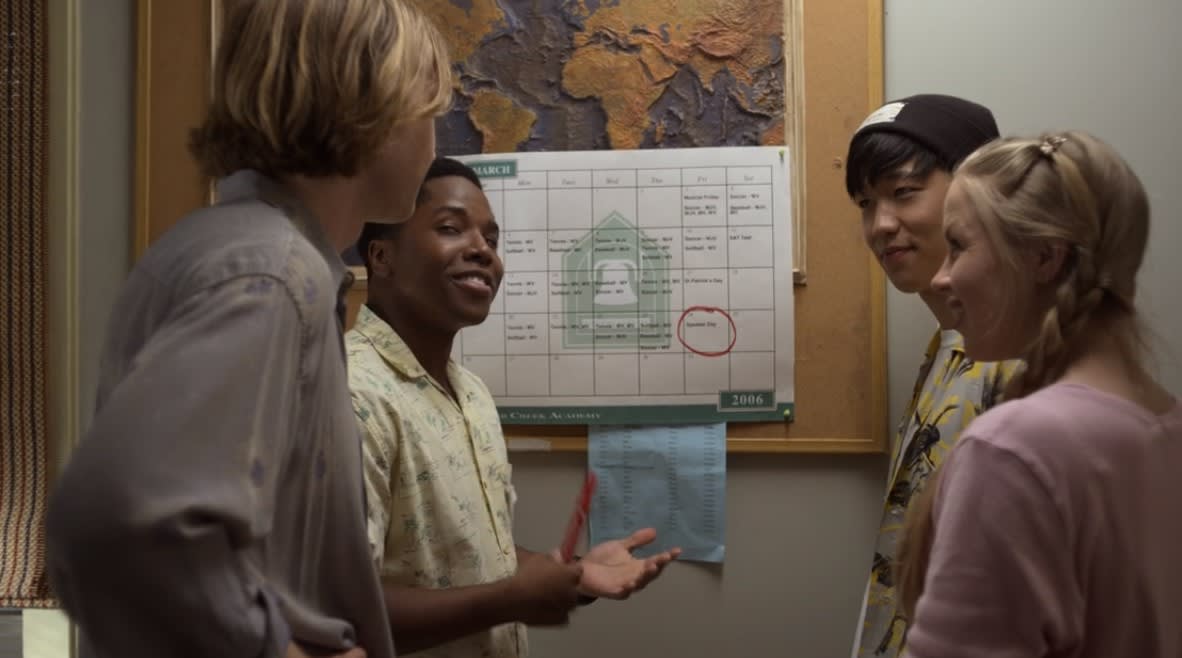 If, like me, you read the book and watched the tv series in tandem, you'll have noticed a lot of differences and similarities between the two products. In the eighth and final episode, the ending is more or less the same, but there are some key differences that truly swayed my opinion about the tv series as a whole.
If, like me, you read the book and watched the tv series in tandem, you'll have noticed a lot of differences and similarities between the two products. In the eighth and final episode, the ending is more or less the same, but there are some key differences that truly swayed my opinion about the tv series as a whole.
Firstly, Takumi gets to participate in the hunt for answers. Near the end of the novel, Takumi kind of fades away, and he feels left out as Miles and the Colonel search for answers. The tv series eliminates this by having Takumi participate with Miles and the Colonel up to the end. This also gets rid of Takumi's guilt, in having seen her the last night. As far as the tv series is concerned, Takumi never saw Alaska that last night, rushing to her car, and thus doesn't have the same level of guilt the Colonel and Miles do. That was an interesting choice, because they could have allowed Takumi to be more involved with the Colonel's and Miles's schemes while also carrying that secret, but the secret also doesn't exist. The alleviates the guilt off Takumi's shoulders (which i am not a fan of), but it also allows Takumi's whereabouts to be known at the end of the series (which I am a fan of). This is a change that has a sort of give-and-take nature. Although, I can say that I think tv show Takumi not having this secret makes sense based on the character of tv show Takumi. Not that tv show Takumi and novel Takumi are that much different, but I feel like this decision was made without regard for novel Takumi.
 Another notable difference, albeit not as important, is the fact that Alaska died one month earlier in the tv series than in the novel. In the novel, it's January, and in the tv series, it's December. This choice does allow Miles to have a moment where he's sure he won't go back to Culver Creek. The significance of this, for me, was to show that he was giving up on the world before he really got to see it. And it also allowed Miles to get back up on his feet when he decided he would go back. I think this gave Miles a more "active" side -- that he's not just a passive character anymore, and can make those decisions for himself.
Another notable difference, albeit not as important, is the fact that Alaska died one month earlier in the tv series than in the novel. In the novel, it's January, and in the tv series, it's December. This choice does allow Miles to have a moment where he's sure he won't go back to Culver Creek. The significance of this, for me, was to show that he was giving up on the world before he really got to see it. And it also allowed Miles to get back up on his feet when he decided he would go back. I think this gave Miles a more "active" side -- that he's not just a passive character anymore, and can make those decisions for himself.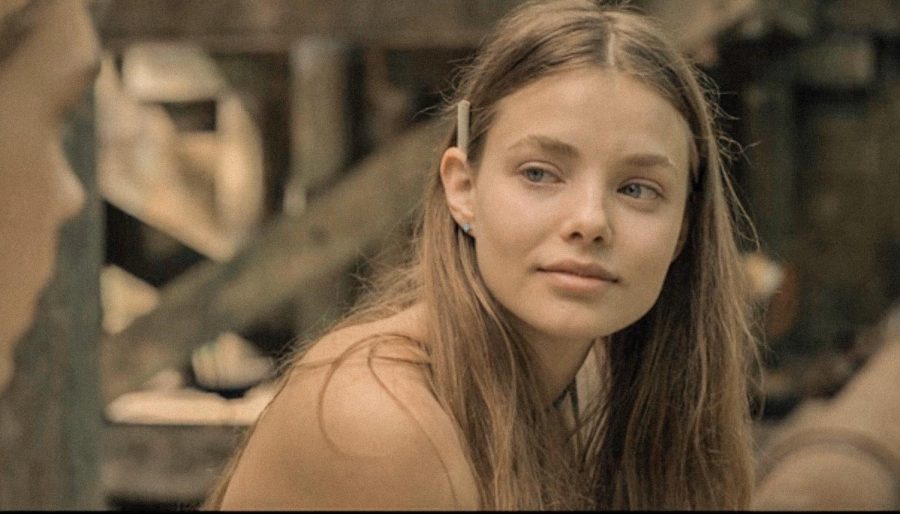 This isn't the only moment where Miles gets some agency. At the end, when Miles and the Colonel drive to the site of Alaska's death, Miles is the one in the driver's seat. In the book, the Colonel is the one that drives. Having Miles drive gave him more agency for this story, and also cast him as the hero of his own story, rather than just the passenger seat guy. I like that decision, because it allows us to see some growth in Miles's character, which is much needed and powerful.
This isn't the only moment where Miles gets some agency. At the end, when Miles and the Colonel drive to the site of Alaska's death, Miles is the one in the driver's seat. In the book, the Colonel is the one that drives. Having Miles drive gave him more agency for this story, and also cast him as the hero of his own story, rather than just the passenger seat guy. I like that decision, because it allows us to see some growth in Miles's character, which is much needed and powerful. 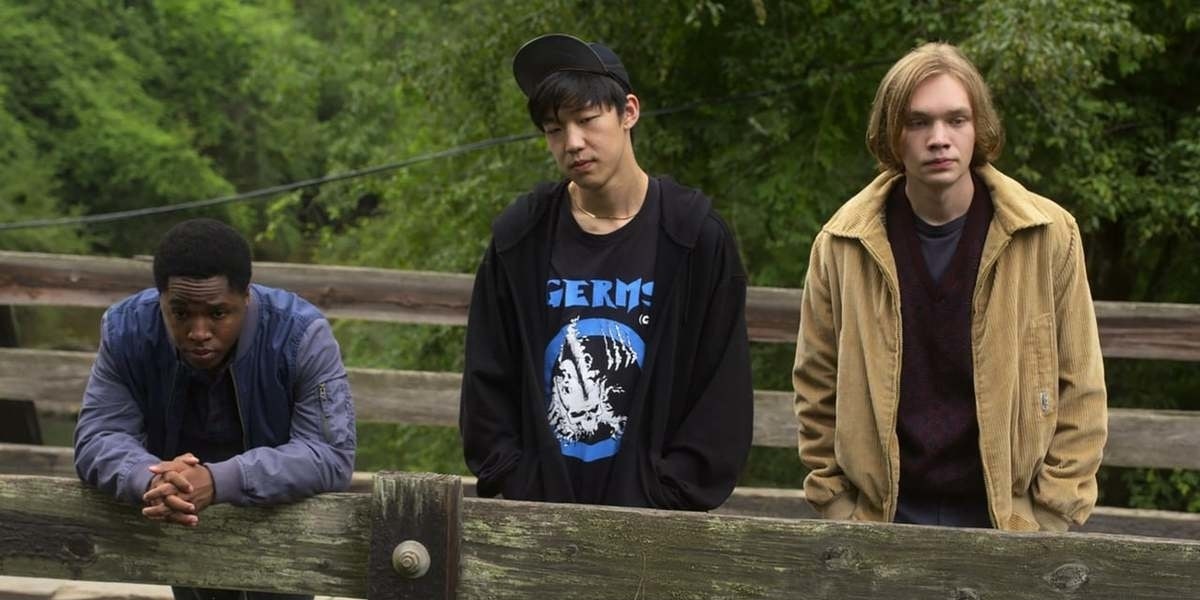 What's also powerful is the fact that Lara and Takumi got together. This is powerful because it's so subtle. Lara has spent so much time on Miles and comparing herself to Alaska, so her ability to move on and do what's best for her is inspiring, especially in a time of grief. Another powerful fact about this was that the show doesn't spend all that much time getting into the details of Lara and Takumi getting together -- that's their story, and not really anyone's business. We know they were making eyes at each other from the beginning, and in the end it means they get their happy ending along with the much-needed closure from Alaska's death.
What's also powerful is the fact that Lara and Takumi got together. This is powerful because it's so subtle. Lara has spent so much time on Miles and comparing herself to Alaska, so her ability to move on and do what's best for her is inspiring, especially in a time of grief. Another powerful fact about this was that the show doesn't spend all that much time getting into the details of Lara and Takumi getting together -- that's their story, and not really anyone's business. We know they were making eyes at each other from the beginning, and in the end it means they get their happy ending along with the much-needed closure from Alaska's death. 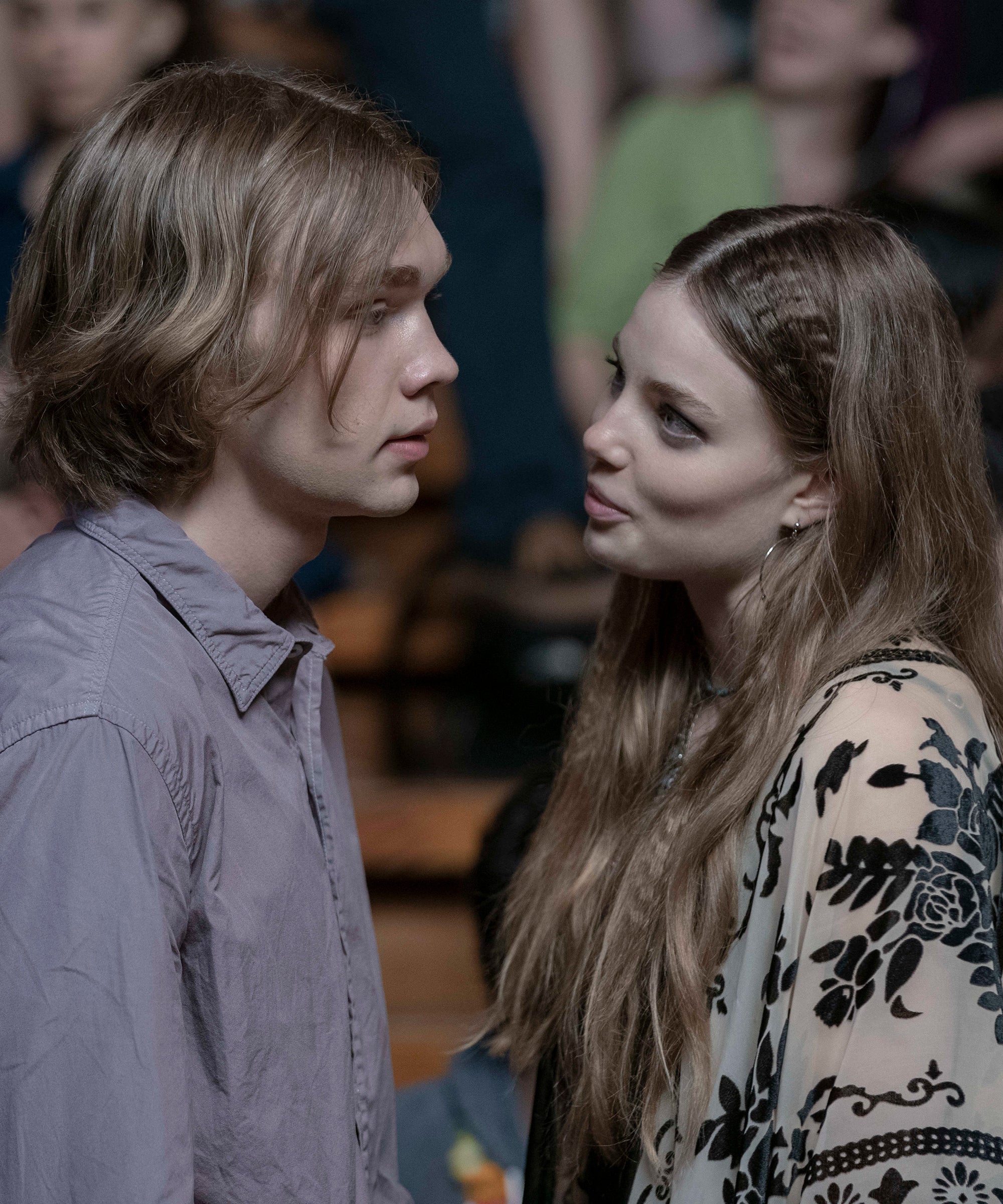 The bench's movement to the smoking hole really brought this entire series to a close in such a meaningful way. It shows viewers that we have the power to claim grief, and to also get closure for it, and to also move past it into the Great Perhaps of life. Miles helps move the bench, and then gets one last look at Alaska while thinking about her one last time. Maybe not the last time in his life, but for the last time right now, because we know that him and his friends are now going to start living for Alaska, and living because she would have wanted them to. Miles's voice over during this part was also perfect, and I admit I shed a tear or two at it. It perfectly mirrored the novel, and it was such a satisfying ending to a beautiful adaptation.
The bench's movement to the smoking hole really brought this entire series to a close in such a meaningful way. It shows viewers that we have the power to claim grief, and to also get closure for it, and to also move past it into the Great Perhaps of life. Miles helps move the bench, and then gets one last look at Alaska while thinking about her one last time. Maybe not the last time in his life, but for the last time right now, because we know that him and his friends are now going to start living for Alaska, and living because she would have wanted them to. Miles's voice over during this part was also perfect, and I admit I shed a tear or two at it. It perfectly mirrored the novel, and it was such a satisfying ending to a beautiful adaptation.
Some Questions I Asked Myself (and their answers)
Did the actors meet expectations and match the characters? Yes! I believe not only were the actors cast well to look the part, but they also acted the part. They did great in bringing my favorite lines, scenes, and facial expressions to life.
Did the book plot and the tv-series plot match? Yes and no. The overarching plot was the same, but there were some storylines and additions to the show that made the tv-series more enjoyable and complex.
Was there any major changes that worked well? My favorite "major changes" would have been the addition of the debutante ball, and the Colonel's blowing up at Alaska's dad. Both additions highlighted the moral complexities of the characters, the guilt the characters carried, and were punches to the gut that weren't in the book. Those two scenes would have to be my favorite major changes.
Was there any major changes that didn't work well? I actually didn't see any changes that didn't work well. All the additions (or retractions) of moments worked well in the show. Most of the changes that I noted were additions, and all of them helped further highlight and expose the complexity of the book.
What was my favorite moment? I feel like I mentioned a few of my favorite moments above in my summary, but here's one that I didn't have the chance to mention. At Alaska's funeral, the mourners are to press their fingertips to Alaska's coffin--something about how they are leaving their fingertips on her, as much as she left fingertips on all their lives. When Miles reaches the front of the line and goes to press his fingertips to the coffin, he breaks down and tells Alaska that he loves her. His facial expression when he breaks down is so heartbreaking, in a way I don't truly have words for. This is one of the moments that caused me to cry, because I really felt Miles's grief in that moment.
So What's the Verdict?
Where does all of this leave us? What's the verdict? Book, or tv series, or both, or neither?
 The book is an extremely complex text. As I was reading it, I found myself both loving and hating it. I loved the story, the passage of time, the portrayal of grief and guilt. But I hated the objectification of Alaska and the passivity of the main character. I think I was supposed to love the things I loved, and hate the things I hated. When blended together, that is the reason I found the book to be so complex in the first place. As I was reading this, I honestly wished I could have written a paper on it, or talked with a classroom full of peers about these feelings. I understand now why this book won the Printz Award. I understand why this book was turned into this tv miniseries.
The book is an extremely complex text. As I was reading it, I found myself both loving and hating it. I loved the story, the passage of time, the portrayal of grief and guilt. But I hated the objectification of Alaska and the passivity of the main character. I think I was supposed to love the things I loved, and hate the things I hated. When blended together, that is the reason I found the book to be so complex in the first place. As I was reading this, I honestly wished I could have written a paper on it, or talked with a classroom full of peers about these feelings. I understand now why this book won the Printz Award. I understand why this book was turned into this tv miniseries.
The miniseries is a work of art, in my opinion. It captures everything from those broad feelings of fascination and guilt, and the smallest details like the plastic daisies and the awful shower. The tv series captured the small brilliances of the novel in a way that meant that those things didn't go over my head. In the book, I was frustrated by Miles's solitary view of Alaska's character. But because in the show we have a wider range of point of views, I felt like I was able to understand the complexities behind Alaska's, Miles's, the Colonel's, Takumi's and everyone else's character. I loved our ability to explore the grief visually, using the same words as the text. In the end, there was a lot more story in the tv series that made the complexities of the novel more compelling.
I think you know where this is going.
I will always be an advocate for reading the book first, because it makes the "bringing the story to life" part of the show so much more exciting. But I know, that if I were to ever engage with the story of Looking for Alaska again, I would watch the tv series. There's so much it does right, while also making the story bigger than the text it was born from.
Let me know your opinion in the comments below. Do you agree, or disagree? And why? And thanks for coming along for the ride!
For more information about the text of Looking for Alaska, visit John Green's FAQ page! I found this to be an amazing resource as I read the book, because he helps articulate the complexities I was noting.
*Part of this review is also posted on my Goodreads page*
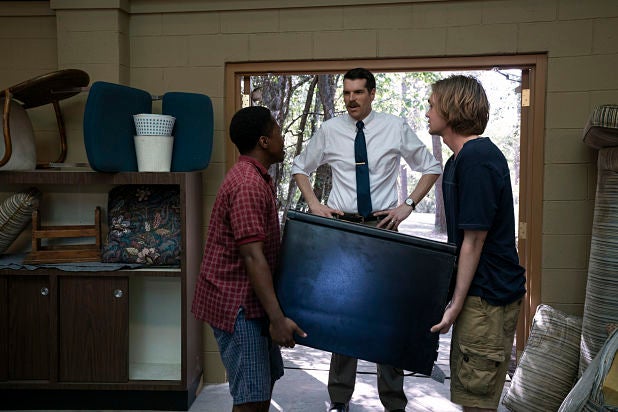


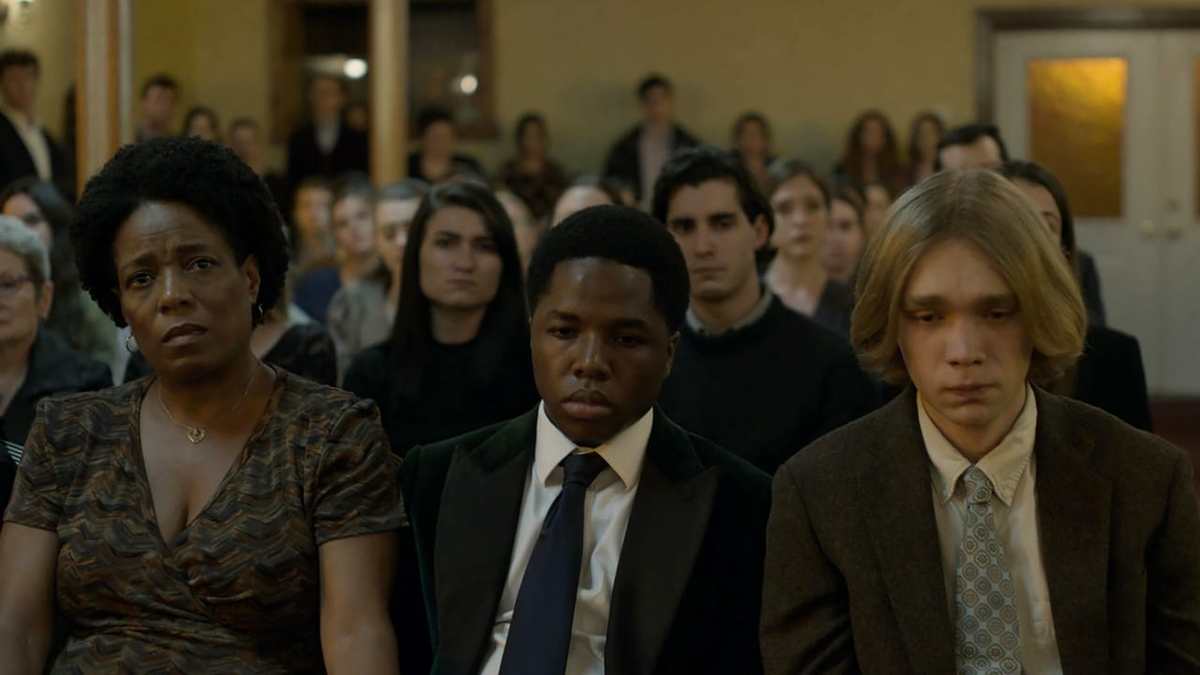
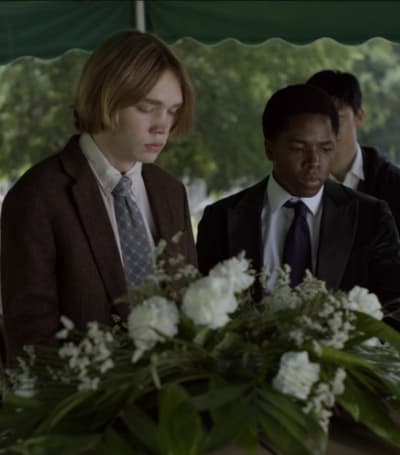
Comments
Post a Comment